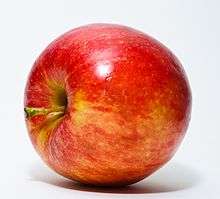maçã
Portuguese

maçã
Etymology
From Old Portuguese maçãa, from Vulgar Latin (māla (“apples”)) mattiana (“of Mattium”), though some theorize that mattiana was an Iberian pronunciation of the Gallo-Roman word matianium, a golden apple named after Gaius Matius, a horticulturist and friend of Caesar.[1]
Cognate with Galician mazá, Aragonese and Asturian mazana, Mirandese maçana and Spanish manzana (Old Spanish maçana).
Pronunciation
Derived terms
- macieira (“apple tree”)
References
- Agnes, Michael, ed. in chief, Webster's New World College Dictionary, fourth edition, MacMillan, 1999.
This article is issued from
Wiktionary.
The text is licensed under Creative
Commons - Attribution - Sharealike.
Additional terms may apply for the media files.